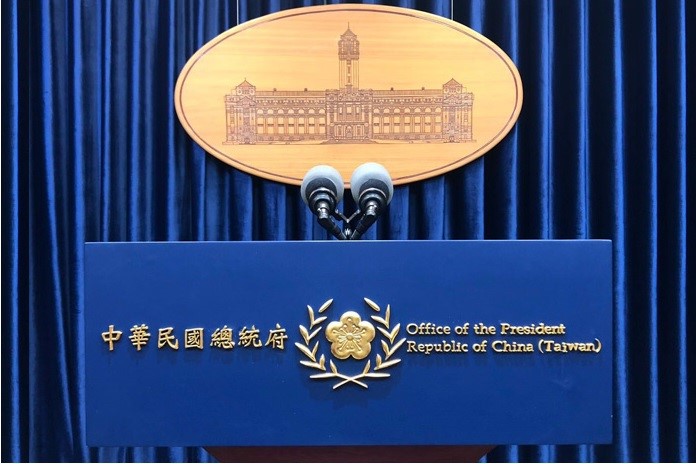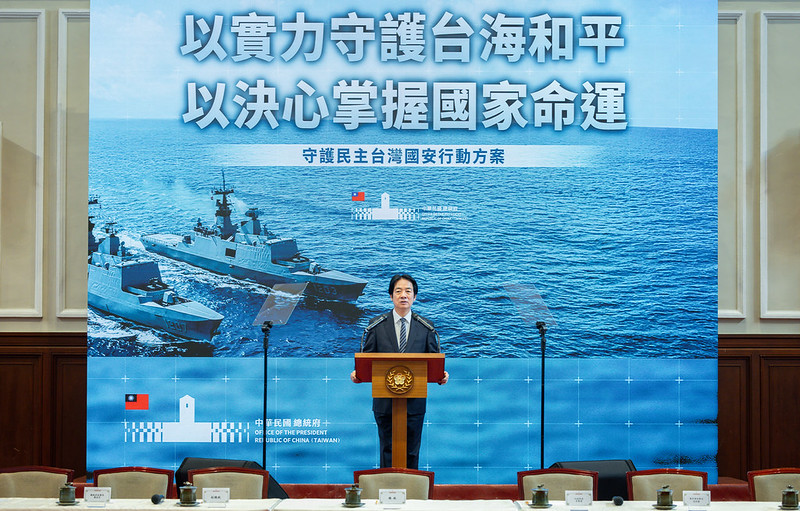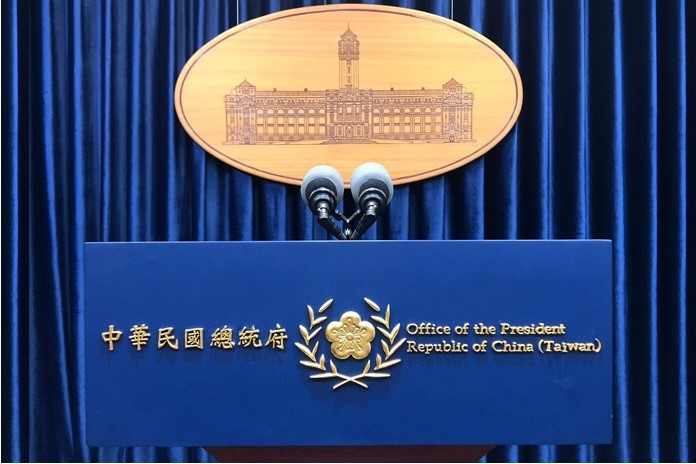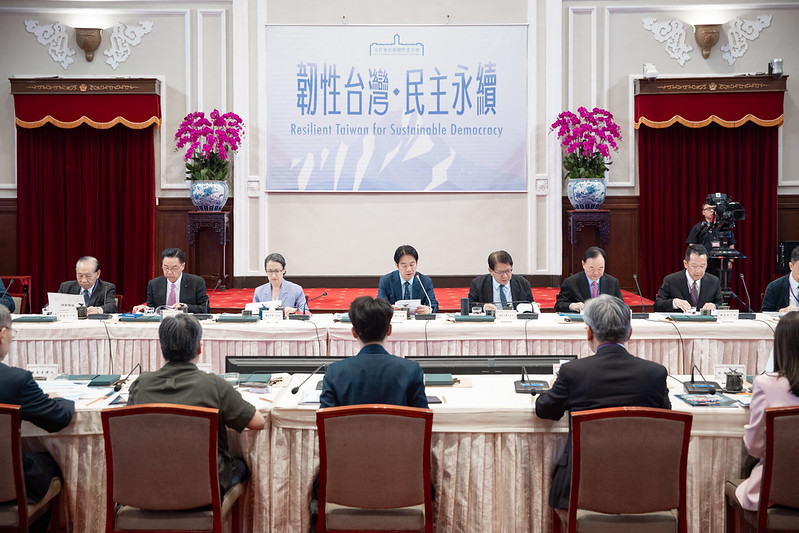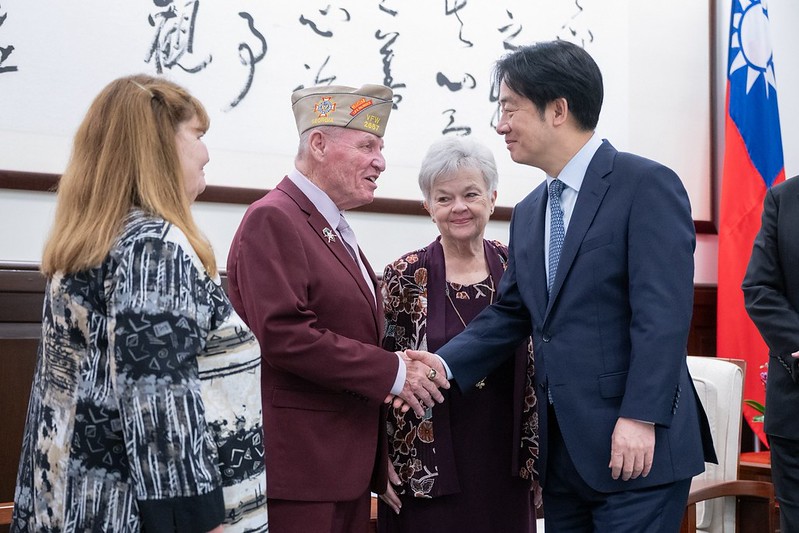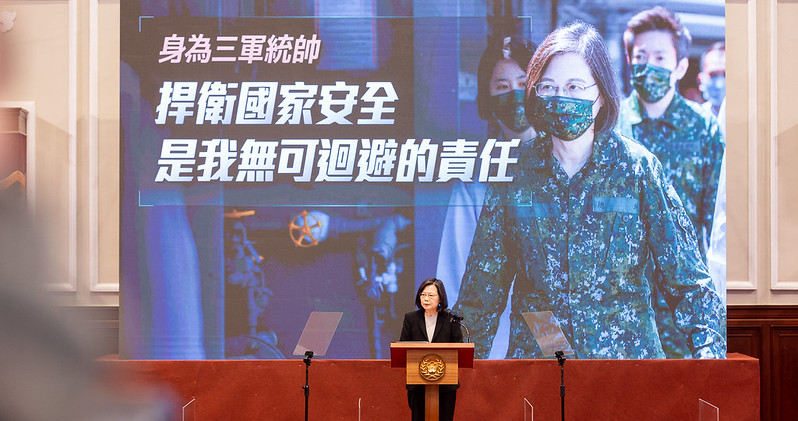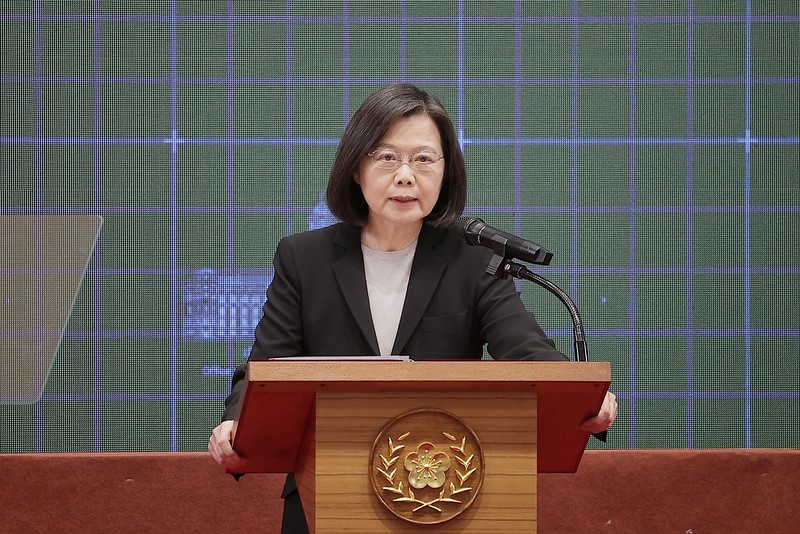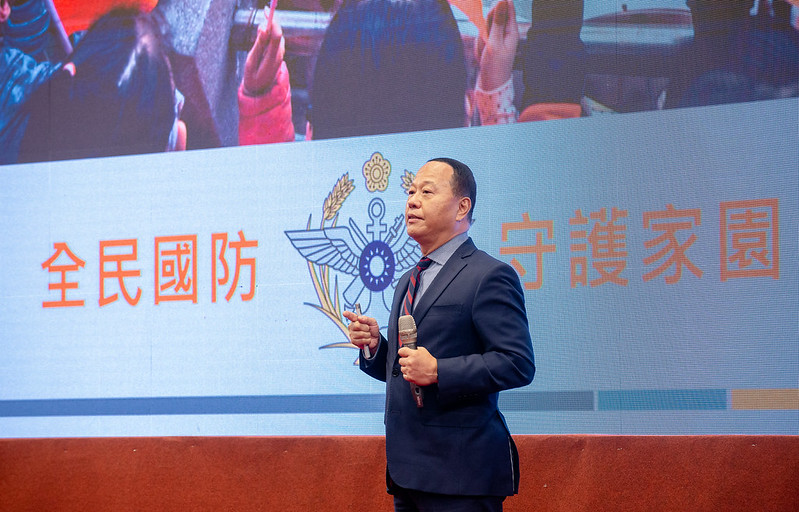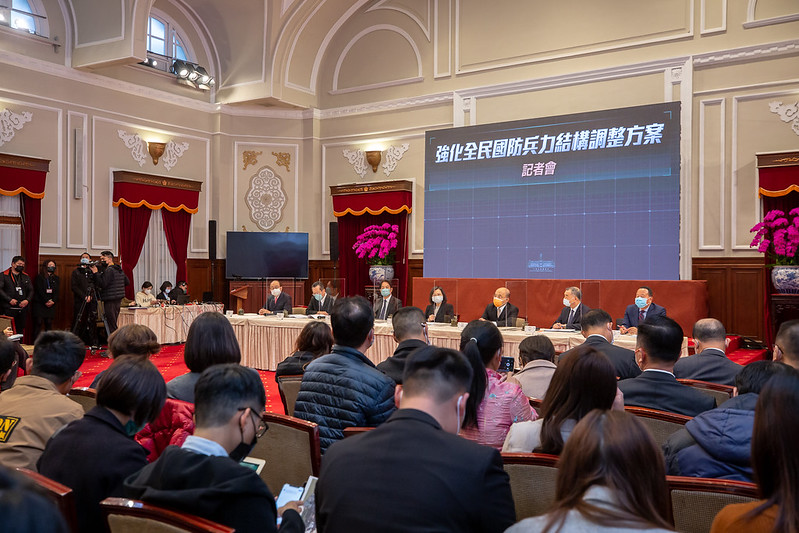News & activities
 News releases
News releases
On the afternoon of December 27, President Tsai Ing-wen convened a press conference in the Reception Hall of the Presidential Office to announce a plan for realigning the nation's military force structure. President Tsai stated that, with Taiwan on the frontlines of authoritarian expansion, "only by preparing for war can we avoid it, and only by being capable of fighting a war can we stop one." The president further said that only by strengthening our self-defense capabilities can we in Taiwan more effectively protect our national security and interests.
President Tsai explained that this force realignment plan to strengthen our all-out national defense will comprise four main elements: a main battle force centered around active-duty volunteer personnel, a standing garrison force of mainly mandatory service personnel, a civil defense system formed by central and local government agencies which integrates alternative military service personnel and private sector resources, and a reserve system.
President Tsai pointed out that, in terms of personnel resources and training quality, the current conscription system of four months of military training is insufficient to meet current military readiness requirements. The president then announced that, beginning in 2024, a one-year term of mandatory military service will be reinstated for eligible males born on or after January 1, 2005. She stated that this one-year mandatory service plan will strengthen training content and expand training capacity, raise wages for conscripts, recognize time in mandatory service under our labor pension system, and study how to help conscripts transition smoothly into future careers.
President Tsai said that we in Taiwan must show our courage and resolve to protect our homeland and defend democracy, and expressed hope that her fellow citizens can support this plan. The president also said she hopes ruling and opposition parties, civil society groups, experts, scholars, and all different segments of society can engage in more productive discussions on how to improve the plan, strengthen our defense capabilities, make yearlong mandatory service more meaningful, secure our nation, and ensure Taiwan's continued survival.
A translation of President Tsai's remarks follows:
Thousands of miles away in Europe, as we all celebrated Christmas last weekend and with the New Year fast approaching, Russia's invasion of Ukraine passed its 300th day and continues unabated. Ukraine, though, has not fallen, and it is still fighting. The determination of the Ukrainian people to defend their homeland has moved democracy- and freedom-loving people around the world.
As in Europe, China's expansion in Asia continues to challenge the international rules-based order, threatening regional peace and stability, and impacting cross-strait relations. China's attempts to coerce Taiwan have become clearer, particularly since its military exercises this past August.
To address the expansion of authoritarianism, key nations in the international and regional community, such as the United States, European Union member states, Japan, Australia, and the Philippines, have each adjusted their strategies, strengthened their defense capabilities, and upgraded their military power.
No one wants war. The government and people of Taiwan do not want it. The international community does not want it.
However, my fellow citizens, peace cannot be taken for granted. As Winston Churchill once said, "You were given the choice between war and dishonour. You chose dishonour and you will have war."
Taiwan stands on the frontlines of authoritarian expansion, at the vanguard of the global defense of democracy. Only by preparing for war can we avoid it – only by being capable of fighting a war can we stop one.
Only by strengthening our self-defense capabilities can Taiwan more effectively protect our national security and interests while garnering further international support.
The better prepared we are, the smaller the chance of adventurism from across the strait. The more united we are, the stronger and safer Taiwan will be.
This is what I want to emphasize – that peace depends on national defense, and national defense depends on the people of Taiwan.
Beginning in 2020, I have for more than two years now personally presided over biweekly meetings in which we have, through joint efforts by the National Security Council and the Ministry of National Defense, conducted a comprehensive review of our nation's defense capabilities, including strategy, operations, force size and structure, and training.
Today, we are announcing a force realignment plan to strengthen our all-out national defense. This new force structure will comprise four main elements:
The first element is a main battle force with an end strength of 210,000 centered around 180,000 active-duty volunteer personnel. With professional training and elite combat capabilities, this force will be on the frontline of our defense, ready to safeguard our national security.
Second, we must create a standing garrison force, comprising mainly mandatory service personnel, whose primary mission will be territorial defense, protection of infrastructure, and preservation of our homeland. This force will also support the main battle force and assist in civil defense work.
By its nature, modern warfare is most likely to involve a high operational tempo. The garrison force under our current system comprises mobilized reservists. But mobilizing reservists is relatively slow, and four months of military training is not enough to form an effective and combat-ready force.
Therefore, at the heart of this realignment plan is the use of volunteer servicemembers as a core, and the regularization of a garrison force with conscripts as a primary source of personnel. In terms of its mission, this garrison force will be a territorial defense force made up mainly of mandatory service personnel.
The third element will be a civil defense system formed by central and local government agencies which integrates alternative military service personnel and private sector resources. Aside from assisting in military operations, it will take on disaster relief, medical treatment, public safety, emergency repairs, and other tasks necessary to ensure the continued functioning of our society.
The fourth element will be a reserve system. In the future, we will aim to replenish our main battle force with retired volunteer soldiers, and our garrison force with former mandatory servicemembers, thereby clarifying and systematizing the integration of our standing and reserve forces.
We will form a sizeable reserve force. In the event of war, we will mobilize reservists to support operations by our main battle and garrison forces and to carry out urban and rural defense.
This realignment will clarify the tasks given to each force and system, facilitate mutual support, and allow us to more fully realize our overall military capabilities. At the same time, it will facilitate professional and technical training at various intensities for different tasks, making training more substantive, specialized, and efficient.
In terms of personnel resources and training quality, the current conscription system of four months of military training is insufficient to address the rapidly changing security landscape or meet current military readiness requirements.
After a comprehensive two-year assessment and review, and in consideration of personnel requirements under this new strategic framework, we have decided that, beginning in 2024, a one-year term of mandatory military service will be reinstated for eligible males born on or after January 1, 2005.
I must admit that this was an incomparably difficult decision. But it is my sworn responsibility as president and commander-in-chief of the armed forces to protect our national security and interests, maintain Taiwan's continued prosperity, and preserve our democratic and free way of life for future generations.
I do know that many citizens feel their time in the military was wasted. Some ask why we should extend training to a year if four months could not be well managed. And some may worry whether this one-year period will be spent just as it was before, full of outmoded training.
In regards to these concerns, I have asked the National Security Council and the Ministry of National Defense to make the following adjustments and supplements to this plan to resume one-year mandatory service:
First is to strengthen training content and expand training capacity.
Future mandatory service training will refer to the training methods used in the United States and other advanced nations, and will incorporate modernized training modules from a range of countries. At the same time, training in the operation of new types of weapons will be expanded, along with realistic combat training courses, live-fire marksmanship drills, joint exercises, and even civil defense coordination. Because of this, we will also expand training capacity.
We will make qualitative and quantitative improvements to training facilities, training methods, instructors, teaching materials, training equipment, and weaponry.
The explanatory documents prepared by the Ministry of National Defense include a detailed inventory of all new training items at each phase of the service period, from enlistment to discharge.
For example, traditional bayonet training will be upgraded to close-combat training, and training in the use of Stinger missiles, Javelin missiles, Kestrel rockets, drones, and other new types of weapons will be added in accordance with mission requirements to meet the needs of modern warfare.
Moreover, the number of live rounds to be fired by each conscript during the two months of basic training will be doubled from 86 to 160, and the number of live rounds to be fired during the entire mandatory service period will be no fewer than 800.
Not only will the one-year mandatory service program starting in 2024 employ a new training model; from next year, training intensity will also be gradually ramped up for conscripts serving for four months.
And starting in 2024, four-month conscripts will undergo the same eight-week basic training that will be given to those serving for one year.
We hope that under this new system, the one year spent in the military will not be wasted, but can be used to transform our conscripts into more mature people. This will make them better equipped to survive, fight, and save others while defending their homeland, their families, and their loved ones.
Second, we will raise wages for conscripts.
These men who are fulfilling their duty to the nation should be given more support. In the past, pay for conscripts was too low, with many even losing money during their time in service. These unreasonable conditions must be changed.
For example, monthly wages for a private under the future one-year mandatory service program will be sharply increased to NT$26,307 (of which he will receive NT$20,320 directly, and NT$5,987 as insurance and meal stipends), which is close to minimum wage. And as a conscript rises in rank, his pay will also increase accordingly.
We hope that these pay raises can cover conscripts' basic expenses during their year of service, help alleviate the burden of student loan payments, and reduce the burdens faced by parents, so that our younger citizens can do their military service with greater peace of mind.
Third, time spent in mandatory military service will be recognized under our labor pension system.
At present, time in mandatory service is only counted toward seniority calculations for public servant retirement plans, and is not credited in the labor pension system for private sector workers. For the sake of fairness, we will push for changes to the law so that the year of service by future conscripts will be recognized under the labor pension system, with the Ministry of National Defense to be responsible for employer appropriations.
While conscripts' fulfillment of their military service is a duty, it is also an honor. We hope that this year of service can become part of the careers of our young citizens, and can help them transition seamlessly to new work while accruing income for their future retirements.
Fourth, the Ministry of Education will communicate with institutions of higher education and refer to the experiences of other nations in studying how our education system can be more flexible in helping conscription-eligible men effectively use their time and transition into future careers.
I hope everyone can support the plan I've announced today. I have instructed the National Security Council and the Ministry of National Defense to continue improving and implementing this plan. I am also keeping an open mind, and I look forward to more productive discussions about this plan among the ruling and opposition parties, civil society groups, experts, scholars, and all different segments of society.
A better plan, stronger defense capabilities, more meaningful yearlong mandatory service, a more secure nation, and Taiwan's continued survival – I believe that all the 23 million people in Taiwan share these common goals.
My fellow citizens, I believe that the vast majority of us all love our country, are willing to do our part for our country, and will do whatever is necessary to defend the loved ones by our sides, no matter the cost.
As long as Taiwan is strong enough, it will continue to be a home of democracy and freedom in the world, and will not become a battlefield to which we will need to send our youth.
My fellow citizens, Taiwan must tell the world that, between democracy and autocracy, we believe firmly in democracy, and that, between war and peace, we are committed to peace. Let us show our courage and resolve to protect our homeland and defend democracy. I believe that doing so will herald victory for global democracy and freedom. Thank you.
